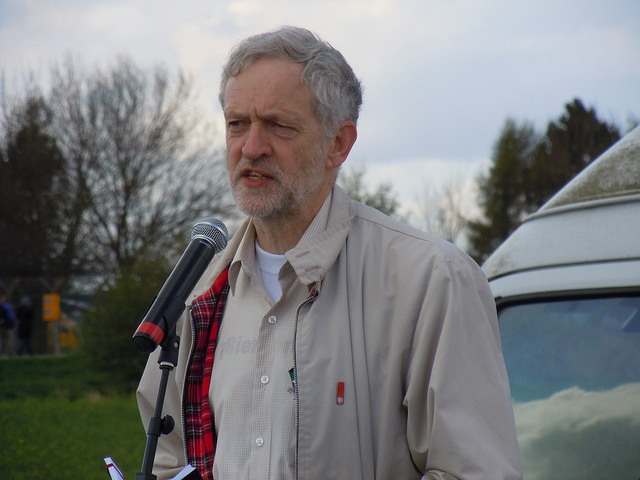Far from destroying the Labour Party, Jeremy Corbyn could save it from electoral wipeout
Jeremy Corbyn, originally a rank outsider, is now the Leader of the UK Labour Party. He did so by gaining an enormous democratic mandate with over half a million voters registering a preference for him. His critics argue that his blend of pacifist leftism is unelectable, but Chris Game argues that to the contrary, if he as able to inspire a mass registration drive, he may actually save the Labour Party in the teeth of an anti voter registration offensive from the Conservative government.

Credit: stopwar.org.uk, CC BY 2.0
Tony Blair doesn’t think much of the most likely next leader of the Labour Party. “Your heart is with Jeremy Corbyn? Then get a transplant,” was but the first of various interventions he made during the party’s protracted leadership campaign – interventions that weren’t just counter-productive, but also rather disingenuous.
A more honest punchline might have gone something like: “Want to win elections? Get yourself a massive electoral bias!” – or even: “Your heart is with Jeremy Corbyn? Great, he’s a better Labour recruiter than even I was!”
Because, make no mistake: whoever leads the party, the vagaries of both the electoral system and voter registration are crucial to its future. Unless it acknowledges the one and attends now to the other, Labour could struggle even more than it will do anyway to claw its way back into power.
Fighting the system
First, the bias. The UK’s first-past-the-post, single-member constituency electoral system is about as proportionally unrepresentative as is democratically feasible. Most notoriously, it discriminates viciously against minor parties with modest but nationwide support. That’s why, in the 2015 general election, the 5m votes for UKIP and the Greens combined earned them one MP each, while the Scottish Nationalists’ 1.5m got them 56.
Governments, though, are mainly decided by the disproportionality or bias between the two major parties. That bias can be huge, but it fluctuates from election to election. The most commonly used measure is the difference between the numbers of MPs each party would have won with an identical share of the vote.
So if, in May 2015, the Conservatives (37%) and Labour (30%) had split the difference and each taken 33.5% of the vote, the Conservatives would have won 301 seats – way short of a 326 Commons majority or their actual 331 – and Labour 254, instead of 232. There was, then, in 2015 a 47-seat net bias to the Conservatives.
Now take Blair’s three victories in 1997, 2001 and 2005, with overall majorities of 178, 166 and 65 respectively. An impressive record, certainly, but one greatly inflated, result-changingly in 2005, by systemic pro-Labour biases of 82, 141, and 111.
Blair’s leadership and New Labour policies undoubtedly deserve full credit for those historic Labour wins, but it’s disingenuous and misleading to ignore the part played by the electoral system – and the fact that now, after two decades strongly in Labour’s favour, the systemic bias has been completely reversed.
The causes are several. The Conservative-threatening Liberal Democrats have been replaced as the main third party by the more Labour-threatening Greens and UKIP. Labour has lost many of its smaller-than-average Scottish and inner-city seats. And all the while the Conservatives have honed an increasingly effective target seat strategy.
The upshot, though, is the same: any future Labour leader – even some Frankenstein fusion of Clement Attlee, Harold Wilson and Blair himself – will be hard-pushed to win even the barest Labour plurality in the May 2020 general election, let alone a majority government.
Drawing the line
That’s without the combined impact of the forthcoming Parliamentary Boundary Review and the ongoing transition from the traditional household-based registration system to Individual Electoral Registration (IER).
The boundary review and its accompanying cull of 50 of the House of Commons’s members could be expected to boost Conservative prospects. IER shouldn’t, yet from the outset Conservative ministers have seemed intent on manipulating the transition to their partisan advantage.
The politically crucial link between the two projects is that the IER registers will provide the exclusive base for the boundary review. Their completeness or otherwise will determine the electoral sizes and political balance of the 600 new constituencies.
IER was a long time reaching the UK, and even in 2002 it was adopted only in Northern Ireland. It is finally being extended to Great Britain through the Coalition’s 2013 Electoral Registration and Administration (ERA) Act.
Some of the draft Bill’s proposals were later modified, but collectively they clearly suggest a Conservative strategy of prioritising the new IER registers’ accuracy (no false entries) over their completeness (every eligible voter being correctly registered at their current address).
The party’s reasoning would be that the less complete the registers are, the more they will exclude predominantly non-Conservative-voting groups – the young and most geographically mobile, social class DE, social housing renters, some black and minority ethnic voters and other hard-to-reach groups.
That would mean not only that fewer constituencies were Labour-winnable, but that there were simply fewer potential Labour supporters registered in 2020.
Stacking the deck
The strategy is well underway. First was the ERA Bill’s proposal to change voter registration into a “personal choice”, meaning anyone could opt out simply by doing nothing. This shocked even MPs, who feared registration rates would plummet to match the most recent election’s 65% turnout rate – and ministers were eventually persuaded to drop it.
Next, the government proposed saving £74m by scrapping the autumn 2014 full annual door-to-door household canvass, the traditional basis of household registration. Instead, IER forms were mailed to everyone on the February/March 2014 registers – on which the Commission estimated that as many as 7.5m electors may have been incorrectly registered.
In July 2015, again rejecting the Electoral Commission’s advice, the government tabled a proposal to avoid jeopardising the accuracy of the registers for the Parliamentary Boundary Review by ending the IER transition period in December 2015 – 12 months earlier than specified in the ERA Act.
If this happens, it is the registers’ completeness that may be jeopardised. An unknowable number of “carried-forward” household-registered electors who have not yet re-registered individually are still on the registers and are set to be removed; by the Commission’s reckoning, there could be up to 1.9m of them.
This is where Jeremy Corbyn comes in. In three months, he has helped increase Labour’s full membership by more than Blair managed in three heyday years – and that’s before you count the likely 100,000-plus Corbynite “registered supporters”.
Regardless of who wins the leadership election, if Corbyn and his team can galvanise their comrades into turning a membership drive into a major voter registration push, Labour’s chances could be genuinely enhanced. It may not win the party the election in 2020, but it could certainly gain or save it some seats.
—
Note: this post originally appeared on the Conversation. It represents the views of the author and not those of Democratic Audit. Please read our comments policy before posting.
—
 Chris Game is an Honorary Senior Lecturer at the Institute of Local Government Studies (INLOGOV), University of Birmingham. His interest are in politics of local government; local elections, electoral reform and other electoral behaviour; party politics; political leadership and management; member-officer relations; central-local relations; use of consumer and opinion research in local government; the modernisation agenda and the implementation of executive local government.
Chris Game is an Honorary Senior Lecturer at the Institute of Local Government Studies (INLOGOV), University of Birmingham. His interest are in politics of local government; local elections, electoral reform and other electoral behaviour; party politics; political leadership and management; member-officer relations; central-local relations; use of consumer and opinion research in local government; the modernisation agenda and the implementation of executive local government.





 Democratic Audit's core funding is provided by the Joseph Rowntree Charitable Trust. Additional funding is provided by the London School of Economics.
Democratic Audit's core funding is provided by the Joseph Rowntree Charitable Trust. Additional funding is provided by the London School of Economics.
Far from destroying the Labour Party, Jeremy Corbyn could save it from electoral wipeout: https://t.co/j2MXTP7Vli
Far from destroying the Labour Party, Jeremy Corbyn could save it from electoral wipeout : Democratic Audit UK https://t.co/6QzwVmjCd6
[…] A couple of weeks ago, I wrote a To The Point post on the “real vote shares” achieved by the winning parties at general elections. Its point was that, if you count all registered voters and not just those who actually vote, support for the victors has almost halved over the past 60-odd years. In 1951, over 40 per cent of all registered voters backed the Conservative Party into government. In 2005, only 21.6 per cent did likewise for Labour. This is the consequence of declining turnout and less support for the two main parties.An update. 47 comments for: Let’s not get carried away. Your NPF SE CLP representatives. Labour Leadership Poll UGOV. Far from destroying the Labour Party, Jeremy Corbyn could save it from electoral wipeout. […]
Far from destroying the #Labour Party, Jeremy #Corbyn could save it from electoral wipeout https://t.co/OxCU3va8dX (via @democraticaudit)
RT @democraticaudit: Far from destroying the Labour Party, Jeremy Corbyn could actually save it from electoral wipeout https://t.co/BF33kQCN…
RT @PJDunleavy: Far from destroying the Labour Party, Jeremy Corbyn could save it from electoral wipeout https://t.co/T5OHcX4p5Y
As a UKIP voter and former representative of the party on the London Assembly, I agree with you in much of what you have said. I would go further in regard to Labour’s heartlands – if Corbyn is brave and copies some of UKIP’s best ‘left wing’ policies (eg scrapping involvement in the shadowy and undemocratic EU-US trade ‘partnership TTIP in its entirety), then he will probably have a major impact on UKIP’s advance in the North from the large number of 2nd places in May’s General Election.
Of course, the likelihood is that he would, in power, capitulate on all his policies – see Syriza in Greece – and simply follow the EU German-driven austerity dogma. Already on a key suggestion regarding public spending on infrastructure, the European Commission has ‘reminded’ journalists that this it will not permit in the manner Corbyn appears to suggest. If that is the case, and it all amounts again to nothing because Westminster has passed up key powers to the EU, then those who have hoped for something from him will be sorely dashed – see Syriza again.
Then what?
Far from destroying the Labour Party, Jeremy Corbyn could save it from electoral wipeout https://t.co/885hrqYTrg #Option2Spoil
Far from destroying the Labour Party, Jeremy Corbyn could save it from electoral wipeout https://t.co/hUexGQ5RKL https://t.co/WJLO1t0Kfk